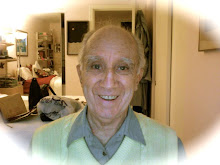Vol. 2 No. 55 Feb 2, 2007
The Bogus Economist
P.A.D.
Part of being a senior at Toms River High School in 1945 was the privilege of taking a course other high schools called “Civics” or “Government” but which Toms River called “Problems of American Democracy,” or simply “P.A.D.” Since TRHS fancied itself at the forefront of New Jersey education - and therefore the world's - P.A.D. was a way of proving it by preparing its students for the rigors of democracy. The course's purpose was for us to discuss, debate, research and generally be aware of the constant challenges we faced in keeping the country as it was meant to be.
P.A.D. was taught by Margery Burd, probably the nicest, smartest and most popular teacher in the school, if not on earth. I looked forward to this class. I had a good time. I learned a lot. I also had a serious crush on Miss Burd.
Now, sixty-one years after my great unrequited love, the biggest Problem of American Democracy seems to be the number of people who are having problems with American Democracy.
Consider TV shows like “Law and Order,” where roughing up a suspect or two is met with cheers from people who presumably support the Constitution, including that thing about cruel and unusual punishment. Of course, some say when it's done often enough, it isn't unusual anymore. I don't think the Founding Fathers had that in mind.
I can hear people even now calling me a sissy and worse for not backing up efforts of law enforcement to teach the bad guys a lesson, even if it means banging their heads against the wall a few times. If we think the guy on the other side of the door is peddling pot, why let a little thing like no warrant keep us from breaking it down? If we're going to keep our citizens safe, then almost anything goes, right? As in many cases, the word “almost” can be tricky.
The Declaration of Independence talks about “inalienable rights” and “life, liberty and the pursuit of happiness.” In those days, these rights were limited to white, relatively well-off male residents of the colonies. But the Founding Fathers said all men, which the courts in modern times have extended to include people of all races, sexes and incomes. I don't see an “almost” here. People picking grapes or being “enemy combatants” deserve the same right to life, liberty, etc. as the rest of us, even though they might not be citizens. This includes a fair hearing if they're accused of breaking the law. Certainly, putting people on trial might involve risk. Who said democracy was safe? Just thinking human rights are subject to debate is a P.A.D.
Moving on to the Constitution, we run into some major “P's” in P.A.D. - freedom of religion, for one. It's hard for many of us who believe our particular belief system is the one, true faith to go along with a government where Christian, Jew, Muslim, Buddhist or atheist must be treated exactly the same. It says in the Constitution, “Congress shall make NO law respecting the establishment of religion” and that seems pretty clear. There are many upstanding Americans who'd be happy to see a manger scene with the baby Jesus on the courthouse square, but might oppose a statue of the Hindu elephant-headed god Ganesh or a dancing Lord Shiva. And how about that uneasy feeling some get when confronted with veiled women? Some get the heebie-jeebies when they see beards on Hasidic Jews or turbans on Sikhs. I used to be a little bit fearful of nuns in full habit.
A really big P.A.D. is thinking somebody who is “different” must be a type of subversive. This includes slapping “treason” labels on those who question unthinking actions or blind patriotism. The people who formed this nation spent months debating, questioning and listening before taking the dangerous - some called treasonous - step of breaking away from England.
Another example of a P.A.D. is the way some of us feel about laws. The thinking is, “”Laws are for the other (bad) guys.” I know I'm a good driver - it's that dumb slowpoke I passed who was only going sixty-five who should get pulled over.
Compared to living under a dictatorship, being a citizen of a democracy can be either much, much harder or an absolute piece of cake. People in dictatorships let others do the thinking for them. If we sit back and let things “happen,” don't bother to look at the actions of the people who make our laws and generally can't be bothered with voting, writing our representatives, being active in political affairs and learning about the problems confronting our country, nothing could be easier than being an American. Of course, we might wake up one morning and find our freedom's not there anymore, but at least we'll know we didn't overwork.
A long time ago, a guy named Voltaire said, “I may not agree with what you say, but I will fight to the death to protect your right to say it.” In this age of insults and ideological myopia, we may have lost Mr. Voltaire's simple key to the secret of America. This is our greatest P.A.D.
Where are you, Margery Burd, when we need you?
-30-
The Bogus Economist (c) 2007
Sunday, February 04, 2007
Subscribe to:
Post Comments (Atom)

No comments:
Post a Comment